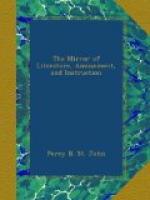Love, and is, in itself, the best type of the messenger
who is one day to lead us gently from the heat and
toils of this world, into the coolness and tranquillity
of the next. Every thing here is in unison with
these thoughts. At a few paces distant from the
Pyramid, and adjoining the wall, the Cippi and funeral
Soroi of the Strangers are to be seen. The bright
verdure and the bright marbles, the classical purity
of the monuments, the desert air, the austere solemnity
of every thing about me, came with new force upon my
imagination. I walked slowly amongst the tombs,
and tried to decipher the inscriptions. The dead
are of various nations,—English, American,
but principally German. Sometimes a cluster of
cypresses shadowed the tomb—sometimes a
fair flowering shrub had twined around it. The
epitaphs were written with elegance always; at times
with the deepest tenderness and beauty. Each
had his short history, each his melancholy interest
and adventure. Here was the man of science and
literature, who came to lay down his head, after a
painful and varied pilgrimage, in this City of the
Soul. A Humboldt was buried here; a Thorwalsden
yet may. Here reposes clay too finely tempered
for the unkindnesses of mankind—Keats lies
near;—a little farther is one who, on the
point of quitting Rome to rejoin an affectionate family
after a too long absence, full of the anticipations
of the traveller and of youth, is thrown from his carriage
at a mile’s distance from the city, and never
quits Rome more;—beside him is an only
child, whom the sun of Italy could not save;—and
next, one who perished suddenly, like Miss Bathurst,
in the very bud and bloom of existence,—or
another, who died away, day after day, in the embraces
of her parents, and now rests in the midst of the
beautiful in vain. The graceful lines of Petrarch
are inscribed on the sarcophagus—they are
full of feeling and the country, and make one pause
and dream:—
“Non come fiamma, che per forza
e spenta,
Ma che per se medesma si consuma,
Se n’ando in pace, l’anima
contenta.”
No epitaph could be better. New Monthly Magazine.
* * * *
*
QUACKS
Have nearly the same interest as knaves in concealing
their ignorance and frauds, and for the most part
regard with the same fear and detestation the instrument
which unmasks their pretensions. This must be
understood with some qualification, because the exposure
of ignorance and fraud is not always sufficient to
open the eyes, and enlighten the understandings, of
mankind. Some perverse dupes are not to be reasoned
out of their infatuation; they had rather hug the impostor,
than confess the cheat; and quacks, speculating upon
this infirmity of human nature, will sometimes court
even an infamous notoriety.—Lancet.
* * * *
*
ANECDOTES OF THE MARVELLOUS.




